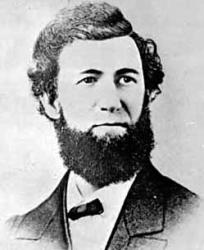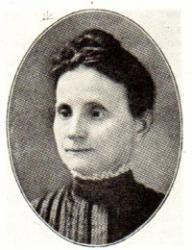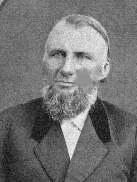Planning worship?
Check out our sister site, ZeteoSearch.org,
for 20+ additional resources related to your search.
- |
User Links
Person Results
‹ Return to hymnal







Export as CSV
Sarah Flower Adams

1805 - 1848 Person Name: Sarah F. Adams Hymnal Number: d135 Author of "Nearer, my God, to thee, nearer to thee" in Songs of Full Salvation Adams, Sarah, nee Flower. born at Harlow, Essex, Feb. 22nd, 1805; died in London, Aug. 14, 1848, and was buried at Harlow, Aug. 21,1848. She was the younger daughter of Mr. Benjamin Flower, editor and proprietor, of The Cambridge Intelligencer; and was married, in 1834, to William B. Adams, a civil engineer. In 1841 she published Vivia Perpetua, a dramatic poem dealing with the conflict of heathenism and Christianity, in which Vivia Perpetua suffered martyrdom; and in 1845, The Flock at the Fountain; a catechism and hymns for children. As a member of the congregation of the Rev. W. J. Fox, an Unitarian minister in London, she contributed 13 hymns to the Hymns and Anthems, published by C. Fox, Lond., in 1841, for use in his chapel. Of these hymns the most widely known are— "Nearer,my God,to Thee," and "He sendeth sun, He sendeth shower." The remaining eleven, most of which have come into common use, more especially in America, are:—
Creator Spirit! Thou the first. Holy Spirit.
Darkness shrouded Calvary. Good Friday.
Gently fall the dews of eve. Evening.
Go, and watch the Autumn leaves. Autumn.
O hallowed memories of the past. Memories.
O human heart! thou hast a song. Praise.
O I would sing a song of praise. Praise.
O Love! thou makest all things even. Love.
Part in Peace! is day before us? Close of Service.
Sing to the Lord! for His mercies are sure. Praise.
The mourners came at break of day. Easter.
Mrs. Adams also contributed to Novello's musical edition of Songs for the Months, n. d. Nearly all of the above hymns are found in the Unitarian collections of Great Britain, and America. In Martineau's Hymns of Praise & Prayer, 1873, No. 389, there is a rendering by her from Fenelon: —" Living or dying, Lord, I would be Thine." It appeared in the Hymns and Anthems, 1841.
-John Julian, Dictionary of Hymnology (1907)
Sarah Flower Adams
Jack P. Scholfield
1882 - 1972 Person Name: J. P. Scholfield Hymnal Number: d223 Author of "Walking and talking" in Songs of Full Salvation
Jack P. Scholfield
B. R. Hanby

1833 - 1867 Person Name: B. R. Hanby Hymnal Number: d222 Author of "'Tis the Lord, O wondrous story" in Songs of Full Salvation Benjamin Russell Hanby was born July 22, 1833, the oldest of eight children, to Bishop William Hanby in Rushville, OH. The family moved to Westerville,OH where Bishop Hanby was a "conductor" on the Underground Railroad. In his short life Benjamin graduated from Otterbein, taught school, became a United Brethren minister, started a singing school, was editor for John Church publishers in Cincinnati and composed many songs and hymns before he died of tuberculosis March 15, 1867. His home in Westerville was Ohio's first memorial to a composer. It was a stop on the Underground Railroad for slaves escaping to Canada and is a national historic site, a Methodist church Landmark and a Network to Freedom site for the National Park Service. There is a Hanby Residence Hall at Otterbein University. Best known for "Up on the housetop" and "Darling Nellie Gray," Hanby published many hymns including "Little Eyes" and "Who is He?
Mary Louise VanDyke
B. R. Hanby
G. A. Young
1855 - 1935 Hymnal Number: d87 Author of "God leads us along" in Songs of Full Salvation
G. A. Young
Mrs. Harry Coghill
1836 - 1907 Person Name: Anna Louisa Walker Coghill Hymnal Number: d226 Author of "Work, for the night is coming, work through the morning hours" in Songs of Full Salvation Coghill, Annie Louisa, née Walker, daughter of Robert Walker, was born at Kiddermore, Staffordshire, in 1836, and married Harry Coghill in 1884. During a residence for some time in Canada several of her poetical pieces were printed in the Canadian newspapers. These were gathered together and published c. 1859 in her Leaves from the Backwoods. In addition to novels, plays for children, and magazine work, she edited the Autobiography and Letters of her cousin, Mrs. Oliphant, in 1898. Her popular hymn,"Work, for the night is coming," p. 317, ii., was written in Canada in 1854, and published in a Canadian newspaper, from which it passed, without any acknowledgement of the authorship, into Ira D. Sankey's Sacred Songs and Solos. Authorized text in her Oak and Maple, 1890, p. 17.
--John Julian, Dictionary of Hymnology, New Supplement (1907)
======================
[See also: http://biographi.ca/en/bio.php?id_nbr=7126]
Mrs. Harry Coghill
Adoniram J. Gordon

1836 - 1895 Hymnal Number: d128 Author of "My Jesus [Savior], I love thee, I know thou art mine" in Songs of Full Salvation Adoniram J. Gordon (b. New Hampton, NH, 1836; d. Boston, MA, 1895) was educated at Brown University, Providence, Rhode Island, and Newton Theological Seminary, Newton, Massachusetts. After being ordained in 1863, he served the Baptist Church in Jamaica Plain, Massachusetts, and the Clarendon Street Baptist Church, Boston. A close friend of Dwight L. Moody, he promoted evangelism and edited The Service of Song for Baptist Churches (1871) as well as The Vestry Hymn and Tune Book (1872). Both Gordon College and Gordon-Conwell Theological Seminary are named after Gordon.
Bert Polman
==================
Gordon, Adoniram Judson, D.D., born at New Hampton, N.H., Apr. 19, 1836. Graduated at Brown University, 1860; entered the Baptist ministry; Pastor of Clarendon Street Baptist Church, Boston, 1869; and died in 1895. He published The Vestry Hymn and Tune Book, 1872; and was one of the editors of the Service of Song for Baptist Churches, 1871. His hymns in common use include:—
1. O blessed Paraclete. [Holy Spirit .] Given in Sursum Corda, 1898, as having been written in 1890.
2. O Spirit's anointing, for service appointing . [Foreign Missions.] This hymn was "written in the summer of 1886, at Northfield School for Bible Study, organised by Mr. Moody. More than one hundred college students connected with this school gave themselves to the work of foreign missions during their stay at Northfield. Four of their number were chosen to visit the colleges in different parts of the country, and endeavour to awaken a deeper interest in missions during the succeeding academic year. At their request Dr. Gordon” wrote this hymn. Baptist Hymns and Hymn Writers.
3. Where art thou, soul! I hear God say. [Divine Chiding.] Published in social meeting edition of The Service of Song, 1881.
--John Julian, Dictionary of Hymnology, New Supplement (1907)
Adoniram J. Gordon
Ellen M. H. Gates

1835 - 1920 Hymnal Number: d81 Author of "Home of the soul" in Songs of Full Salvation Gates, Ellen, née Huntingdon, of Elizabeth, New Jersey, is the author of several popular pieces in the American Mission and Sunday School hymn-books. Of these the following have passed from the American books into Sankey's Sacred Songs and Solos:—
1. Come home, come home, you are weary at heart. Invitation.
2. I am now a child of God. Saved through Jesus.
3. I will sing you a song of that beautiful land. Concerning Heaven.
4. O the clanging bells of time. Yearning for Heaven.
5. Say, is your lamp burning, my brother. Watching and Waiting.
Concerning her poem which is used as a hymn in America, "If you cannot on the ocean" (Duty), Duffield says her account of its origin is as follows:—"The lines were written upon my slate one snowy afternoon in the winter of 1860. I knew, as I know now, that the poem was only a simple little thing, but somehow 1 had a presentiment that it had wings, and would fly into sorrowful hearts, uplifting and strengthening them." (English Hymns, 1886, p. 257.)
--John Julian, Dictionary of Hymnology, Appendix, Part II (1907)
======================
Gates, Ellen, p. 1565, i., now (1906) of New York city, was born at Torrington, Conn., and married to Isaac E. Gates. Her poems, &c, were published as Treasures of Kurium, 1895. Concerning Dr. March's hymn, "Hark! the voice of Jesus crying" (q.v.), and Mrs. Gates's "If you cannot on the ocean," some confusion has arisen, mainly, we think, from the fact that the opening line of Mrs. Gates's hymn, written in 1860, and the first line of Dr. March's second stanza are nearly the same, i.e., "If you cannot on the ocean," and "If you cannot cross the ocean." The incident which associates the late President Lincoln's name with this hymn is thus set forth by Mr. Philip Phillips in his Singing Pilgrim, 1866, p. 97:—
"The words of this truly beautiful song ['If you cannot on the ocean'] were written by Mrs. Ellen H. Gates . . . When our lamented President Lincoln heard Mr. Phillips sing it at the Hall of Representatives in Washington, Feb. 29, 1865, he was overcome with emotion, and sent up the following written request [given in facsimile on p. 97] to Hon. Wm. H. Seward, Chairman, for its repetition:—' Near the end let us have "Your Mission" [the title of the hymn] repeated by Mr. Phillips. Don't say I called for it. A. Lincoln.' "
It was through this incident that the hymn became known through America as " President Lincoln's favourite hymn." [Rev. James Mearns, M.A.]
--John Julian, Dictionary of Hymnology, New Supplement (1907)
Ellen M. H. Gates
William Hiley Bathurst

1796 - 1877 Person Name: William H. Bathurst Hymnal Number: d141 Author of "O, for a faith that will not shrink" in Songs of Full Salvation Bathurst, William Hiley , M.A., son of the Rt. Hon. Charles Bragge (afterwards Bathurst) some time M.P. for Bristol, born at Clevedale, near Bristol, Aug. 28, 1796, and educated at Winchester, and Christ Church, Oxford, graduating B.A. in 1818. From 1820 to 1852 he held the Rectory of Barwick-in-Elmet, near Leeds. Resigning the Rectory in the latter year, through his inability to reconcile his doctrinal views with the Book of Common Prayer, he retired into private life, and died at Lydney Park, Gloucestershire, Nov. 25, 1877. His works include, The Georgics of Virgil: Translated by W. H. B., 1849; Metrical Musings; or, Thoughts on Sacred Subjects in Verse, 1849; and Psalms and Hymns for Public and Private Use, 1831 (2nd ed. 1842). This last contains 141 versions of Psalms, and 206 hymns. All the latter, and many of the former are original. Of his hymns, those in most extensive use are, "Hark! the distant isles proclaim," "Holy Spirit from on high,” "Jesus, Thy Church with longing eyes,” "Eternal Spirit, by whose power," "O for a faith that will not shrink” and “O Saviour, may we never rest." In addition to these and a few others (all of which are annotated under their first lines), the following are in common use, but mainly in America:—
1. Before Thy cross, my dying Lord. Faith.
2. Before Thy mercy-seat, O Lord. Holy Scriptures.
3. Behold what unspeakable love. Heaven.
4. Does the Lord of Glory speak? Holy Scripture.
5. Ere the world with light invested. Holy Spirit.
6. Except the Lord our labours bless. Ps. cxxvii.
1. Full of weakness and of sin. The Creator Spirit desired.
8. Glory to the Almighty Father. Praise.
9. Holy Lord, our hearts prepare. Preparation for Prayer.
10. Holy Spirit from on high. Holy Spirit's direction implored.
11. How blest are they who feel the weight. Repentance.
12. How strange that souls whom Jesus feeds. Conflict.
13. How sweet it is in early youth. Youthful Piety.
14. How sweet the hour of closing day. Death.
15. Led by a Father's gentle hand. Communion of Saints
16. Lord, a better heart bestow. Lent.
17. Lord, bid the light arise. To the Holy Spirit.
18. Lord, shed Thy glory as of old. Whitsuntide.
19. Lord, what blessed consolation. Safety of the Church.
20. Lord, when our offerings we present. Offertory.
21. 0 for a beam of heavenly light. Lent.
22. 0 for that flame of living tire. Holy Spirit.
23. 0 give thanks unto the Lord. Ps. cv.
24. Shepherd of Israel, from above. On behalf of Children.
25. This day the Lord hath called His own. Sunday.
26. When the world my heart is rending. Heaven.
27. Why search ye in the narrow tomb? Ascension.
28. Ye servants of the living God. Praise.
All these hymns were given in his Psalms & Hymns , &c, 1831 (Preface dated November 15th, 1830), and repeated, without alteration, in the 2nd ed., 1842. They are characterized by simplicity of language, and directness of aim; but do not in any instance rise above the ordinary level of passable hymn-writing. In some American collections Bathurst's name is contracted to "Bath," and this is regarded either as a complete surname or as a Bath Collection. The contraction was given by Bickersteth in his Christian Psalmody, 1833.
--John Julian, Dictionary of Hymnology (1907)
===================
Bathurst, William H., p. 117, ii. Additional hymns from his Psalms & Hymns, 1831, are in common use as follows:—
1. Great God, when I approach Thy throne. Redemption.
2. How bright a day was that which saw. The First Sabbath.
3. How frail and fallible I am. Jesus Unchangeable.
4. In Jesus' name with one accord. Divine Worship.
5. Lord, I claim Thee for my own. Ps. lxiii.
6. Lord shew Thy glory as of old. This is not "Lord shed Thy glory, &c," as stated at p. 118, i., 18.
7. Lord, when I lift my voice to Thee. Ps. ci.
8. O Lord, defend us as of old. Ps. lxxiv.
9. O Lord, how long shall heathens hold. Ps. lxxix.
10. 0 Lord, look down with pitying eye. Intercession for the Jews. Begins with st. iv. of “0 how is Zion's glory gone."
11. Praise God, O my soul. Ps. cxlvi.
12. Saviour, at Thy feet we bow. United Prayer.
13. 'Tis past, that agonizing hour. Ascension.
14. The Lord look'd all around. Universal Corruption.
15. To the Source of every blessing. Praise to the Father.
16. What can relieve the troubled soul? Christ the Comforter.
--John Julian, Dictionary of Hymnology, Appendix, Part II (1907)
William Hiley Bathurst
Ada Blenkhorn

1858 - 1927 Hymnal Number: d191 Author of "All the way along it is Jesus" in Songs of Full Salvation Ada Jane Blenkhorn Canada 1858-1927 Born in Cobourg, Ontario, the 10th of 11 children, she emigrated with her family to the U.S. In 1884 and settled in Cleveland, OH.. She was raised a Methodist, and began writing hymn lyrics at age 34. A prolific writer of hymn lyrics, she was about to give it up when a friend encouraged her to continue, telling her some soul might be saved by a hymn she would write. She worked for many years as secretary to her brother, Henry's, real estate company. After his death in 1923, she became president of the company. She never married.
John Perry
Ada Blenkhorn
J. K. Alwood

1828 - 1909 Person Name: Josiah K. Alwood Hymnal Number: d151 Author of "The unclouded day" in Songs of Full Salvation Alwood, Josiah Kelley. (Harrison County, Ohio, July 15, 1828--January 13, 1909, Morenci, Michigan). Ordained by the United Brethren in Christ, he spent many years as a circuit rider, traveling on horseback to his many appointments. He would be gone from his family for weeks at a time while he held revival meetings and lectured on Christian doctrine. Later, he became a presiding elder in the North Ohio Conference and was a delegate to several general conferences of his church. Always a staunch supporter of the original constitution of his denomination, he was a delegate to the general conference at the time of the separation of the church into two groups at York, Pennsylvania, in 1889.
--William J. Reynolds, DNAH Archives
J. K. Alwood


 My Starred Hymns
My Starred Hymns


